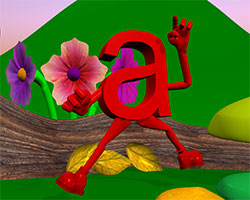
Effective Learning
Phonics based literacy schemes are the most effective method of tuition for the majority of children.
In multiple research projects in the US and UK, phonics based learning has proved to be the most effective method of literacy tuition for the broadest range of children. In the UK, the so called Synthetic Phonics approach has been demonstrated to be particularly effective. One major research programme has established that such phonics based schemes, supported by informed teaching expertise, has the potential to virtually eliminate social differences between children. (*see ERR).
FruitPhonics seek to exploit the latest in media technology to inform media design, and meld this with optimal teaching strategies for early learning. The early results are FruitPhoniucs, which combines 3D animation, a combination of leading edge ICT technologies with the most effective phonics based early literacy teaching practices. Our objective is to set a new benchmark for immersive, effective learning environments, tools and content.
We offer an innovative, multi platform set of learning materials. Choose from internet video, portable device video, or our leading edge real time 3D animation format.
Immersive education works. The separation of education and general media is artificial and becoming ever more difficult to sustain. Children have a 'voice' of expression. For education to be effective it must embrace language and structure that is resonant of their media experience and evolution, or risk becoming, at best dissonant, and possibly irrelevant.
New technology changes the nature, the very form and context of information, how it is characterised, disseminated and absorbed. We believe that the cognitive processes that determine our interaction with information are undergoing a revolution. As a child grows, they will themselves evolve through several generations of media cognition. To design learning materials that are consistent with that experience is a prerequisite to relevance and effectiveness.
We believe that by harnessing the potential of video, interactive 3D animation and new technologies we can re-imagine the the structure, context and form of learning materials, to maximise their impact and support the conceptual and psychological development of children accross the world. In the beginning there is Phonics, the root of the English language, admittedly the linguia franca of the moment.
The *ERR suggests that an effective Phonics programme can virtually eliminate social differences and the need for intervention teaching. Our objective is to support all such efforts to maximise the potential of children of all ages, although logic does dictate that the younger the better.
It is imperative that basic phonics skills are learned early and efficiently. Every day of improved literacy improves the prospects for every additonal day of our future. For children, falling behind can be catastrophic because of the compound nature of progress. Sustained support and intensive work by parents and skilled learning professionals can close seemingly vast gaps. We need the learning materials to make the exercise relevant, stimulative, emotive and productive for the child. FruitPhonics is our beginning.
*The early Reading Research Project (UK), lead by J. Solity, Warwick University

